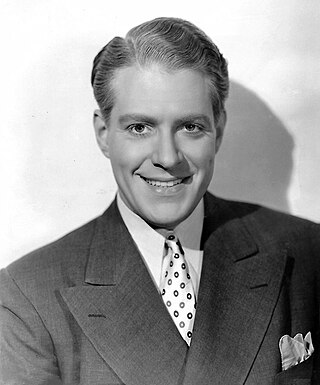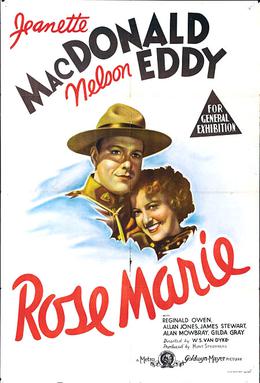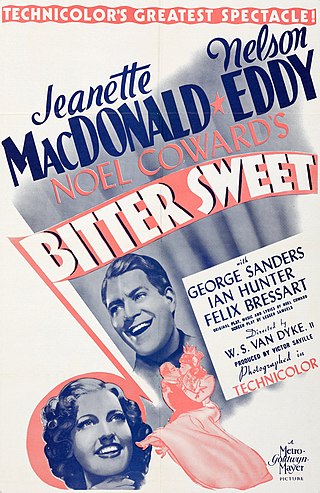
Jeanette Anna MacDonald was an American singer and actress best remembered for her musical films of the 1930s with Maurice Chevalier and Nelson Eddy. During the 1930s and 1940s she starred in 29 feature films, four nominated for Best Picture Oscars, and recorded extensively, earning three gold records. She later appeared in opera, concerts, radio, and television. MacDonald was one of the most influential sopranos of the 20th century, introducing opera to film-going audiences and inspiring a generation of singers.

Nelson Ackerman Eddy was an American actor and baritone singer who appeared in 19 musical films during the 1930s and 1940s, as well as in opera and on the concert stage, radio, television, and in nightclubs. A classically trained baritone, he is best remembered for the eight films in which he costarred with soprano Jeanette MacDonald. He was one of the first "crossover" stars, a superstar appealing both to shrieking bobby soxers and opera purists, and in his heyday, he was the highest paid singer in the world.
Knickerbocker or Knickerbockers may also refer to:

Panama Hattie is a 1940 American musical with music and lyrics by Cole Porter and book by Herbert Fields and B. G. DeSylva. The musical is about a nightclub owner, Hattie Maloney, who lives in the Panama Canal Zone and ends up dealing with both romantic and military intrigue. The title is a play on words, referring to the popular Panama hat.

Knickerbocker Holiday is a 1938 musical written by Kurt Weill (music) and Maxwell Anderson ; based loosely on Washington Irving's Knickerbocker's History of New York about life in 17th-century New Netherland. The musical numbers include "September Song", now considered a pop standard.
"September Song" is an American standard popular song composed by Kurt Weill with lyrics by Maxwell Anderson. It was introduced by Walter Huston in the 1938 Broadway musical production Knickerbocker Holiday. The song has been recorded by numerous singers and instrumentalists.

Constance Dowling was an American model turned actress of the 1940s and 1950s.

Doretta Morrow was an American actress, singer and dancer who appeared in stage and television productions during the 1940s and 1950s. She is best remembered for having created roles in the original productions of three successful Broadway musicals: Kitty Verdun in Where's Charley? (1948), Tuptim in The King and I (1951) and Marsinah in Kismet (1953). She co-starred in the 1952 Hollywood film Because You're Mine, as Mario Lanza's love interest. She appeared in several live television musicals. She retired from performance in 1960 at the age of 33.

Maytime is a 1937 American musical and romantic-drama film produced by MGM. It was directed by Robert Z. Leonard, and stars Jeanette MacDonald and Nelson Eddy. The screenplay was rewritten from the book for Sigmund Romberg's 1917 operetta Maytime by Rida Johnson Young, Romberg's librettist; however, only one musical number by Romberg was retained.

New Moon is a 1940 American musical film released by Metro-Goldwyn-Mayer and directed by Robert Z. Leonard, with uncredited direction by W. S. Van Dyke.

The Chocolate Soldier is a 1941 American musical film directed by Roy Del Ruth. It uses original music from the Oscar Straus 1908 operetta of the same name, which was based on George Bernard Shaw’s 1894 play Arms and the Man. Unable to come to terms with Shaw, the studio used a story to which it already had rights: the Ferenc Molnár play The Guardsman,. The plot centers on the romantic misunderstandings and professional conflicts between two recently married opera singers, played by Metropolitan Opera star Risë Stevens and Nelson Eddy, who perform excerpts from the operetta during the film. This screenplay was written by Leonard Lee and Keith Winter. The Guardsman—a huge hit on Broadway in 1924— was brought to the screen in 1931, with Alfred Lunt and Lynn Fontanne reprising their stage roles as married actors.

Rose Marie is a 1936 American musical Western film directed by W. S. Van Dyke and starring Jeanette MacDonald, Nelson Eddy and Reginald Owen. It is the second of three Metro-Goldwyn-Mayer film adaptations of the 1924 Broadway musical of the same name. A silent version was released in 1928 and a color film in 1954. All three versions are set in the Canadian wilderness. Portions of Rudolf Friml and Herbert Stothart's original score for the Broadway musical are included in both the 1936 and 1954 films.
The Knickerbocker Group was a somewhat indistinct group of 19th-century American writers. Its most prominent members included Washington Irving, James Fenimore Cooper and William Cullen Bryant. Each was a pioneer in general literature—novels, poetry and journalism. Humorously titled after Irving's own pen name, many others later joined the club. These include James Kirke Paulding, Fitz-Greene Halleck, Joseph Rodman Drake, Robert Charles Sands, Lydia Maria Child, Gulian Crommelin Verplanck, and Nathaniel Parker Willis, most of whom were also frequent contributors to the literary magazine The Knickerbocker.

Bitter Sweet is a 1940 American Technicolor musical film directed by W. S. Van Dyke, based on the operetta Bitter Sweet by Noël Coward. It was nominated for two Academy Awards, one for Best Cinematography and the other for Best Art Direction by Cedric Gibbons and John S. Detlie.

Rosalie is a 1937 American musical film directed by W.S. Van Dyke and starring Eleanor Powell, Nelson Eddy and Frank Morgan. An adaptation of the 1928 stage musical of the same name, the film was released in December 1937. The film follows the story of the musical, but replaces most of the Broadway score with new songs by Cole Porter. The story involves the romantic entanglements of a princess in disguise and a West Point cadet.

The Code of Marcia Gray is a 1916 silent romantic crime drama produced by Oliver Morosco, distributed through Paramount Pictures and directed by Frank Lloyd.

Northwest Outpost is a 1947 American Musical Western film directed by Allan Dwan and starring Nelson Eddy and Ilona Massey. The film was Eddy's last, and is an operetta film like his previous starring roles. He was persuaded to make it by Republic Pictures because Rudolf Friml was writing the score. It was well received by critics and had a strong box office performance.
Sally Sweetland was an American soprano singer and teacher. She was active in the film and recording industry during the 1940s and 50s, before moving into teaching.
Student Tour is a 1934 American musical film directed by Charles Reisner, written by Ralph Spence and Philip Dunne, and starring Jimmy Durante, Charles Butterworth, Maxine Doyle, Phil Regan, Douglas Fowley and Nelson Eddy. It was released on October 5, 1934, by Metro-Goldwyn-Mayer.

My Kingdom for a Cook is a 1943 American comedy film directed by Richard Wallace, which stars Charles Coburn, Marguerite Chapman, and Bill Carter.















